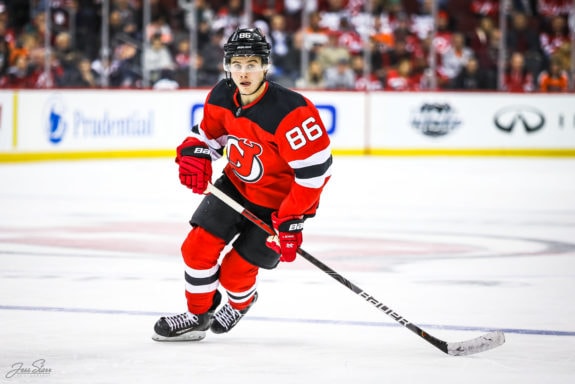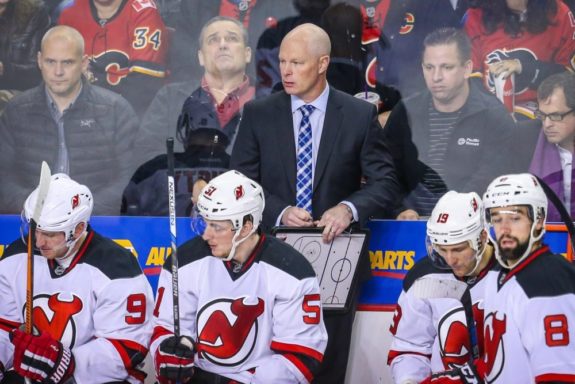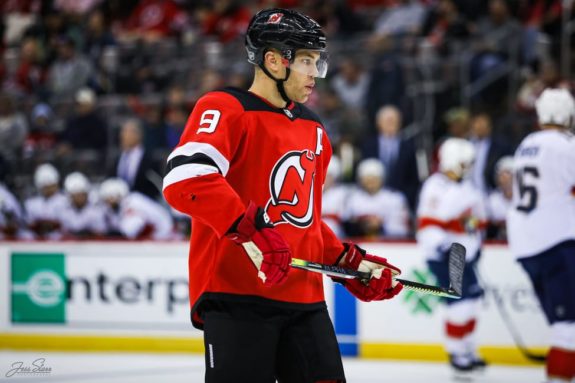The New Jersey Devils haven’t gotten off to the start they’ve wanted or expected. Through their first 23 games, they have an 8-11-4 record, which puts them at the bottom of the Metropolitan Division. That’s not where many people — including myself — predicted this team would be, especially after an offseason that including acquiring P.K. Subban and Nikita Gusev, as well as drafting Jack Hughes.
History tells us being out of a playoff spot at an American Thanksgiving means the Devils have quite the uphill climb to get back into contention. They’ll need drastic improvements to get to where they want to be, so what needs to change?
Devils’ First Quarter Broken Down
The Devils could not have gotten off to a worse start to 2019-20, as they lost their first six games of the season and fell to 0-4-2. That rough play continued through all of October, with the Devils winning only two games. But even though they only had two wins through their first 11 games, they probably should’ve been able to bank a couple more.
While it’s not a complete determiner of success, the Devils were able to control the expected goals share (xGF%) more often than not through 11 games — their 51.08 xGF% ranked 15th best in the league. So why weren’t they able to come away with more wins? There are a few reasons, but it was mainly due to some brutal goaltending.
The Devils had an xG against of 25.29 at all strengths but allowed 44 goals. Couple that with a league-worst save percentage (SV%) of .860%, and that’s how you end up with two wins in 11 games. But there has been a noticeable change in the Devils’ xG share over their last 12 games in November:

Their xGF% peaked on Nov. 5 and has steadily declined to 47.88%, ranked eighth-worst since Nov. 2. What’s changed over the last few weeks is the Devils’ goaltending, and it’s been for the better. They have a .918 five-on-five SV%, as well as a .907 SV% at all strengths (the former ranks 21st, while the latter ranks 13th best in the NHL).
A big reason for the improved goaltending has been Mackenzie Blackwood. He has a .910 SV% in his last nine starts and has taken the reigns as the starter amid Cory Schneider’s struggles, who was placed on waivers and sent to the AHL to work on his game.
Related: Devils & Schneider: What’s Next for Both
In a corresponding move, the Devils called up the recently acquired Louis Domingue. He performed well in his first start, stopping 19/20 shots against the Detroit Red Wings in a 5-1 win. If he can be a reliable backup behind Blackwood, then the Devils’ goaltending should continue improving.
The Devils Need Consistent Lines
The Devils’ offense was supposed to take a significant step forward this season, but that has not been the case through 22 games. They’re averaging 2.52 goals per game, ranked 29th in the NHL. And that shouldn’t be the case with a roster that has Taylor Hall, Nico Hischier, Kyle Palmieri, Hughes, and Gusev.
The struggle to generate offense has been a problem at both five-on-five and the power play, but the former has been more of a concern. The Devils are averaging 50.22 shot attempts per 60 minutes (CF/60), ranked last in the league, and 2.48 expected goals for per 60 minutes (xGF/60), ranked seventh to last. The Devils don’t lack talent up front, so why has generating offense been such a problem?

There isn’t a sole reason, but one may be that head coach John Hynes is juggling his lines a bit too often. However, that doesn’t mean there aren’t some combos he could look to for consistency. Here’s one set that’s worked particularly well:
- Hall – Hughes – Palmieri
- Pavel Zacha – Hischier – Jesper Bratt
- Blake Coleman – Travis Zajac – Gusev
- Miles Wood – Kevin Rooney – Wayne Simmonds
The top line of Hall, Hughes, and Palmieri has been the team’s best this season — the Devils have a 64.71 xGF% and have averaged 2.93 xGF/60 with them on the ice. The Devils have a 47.98 xGF% and have averaged 1.85 xGF/60 when Hischier has played in Hughes’ spot, so it should be an easy move to make.
Another set that Hynes could consider would involve tweaking his middle-six:
- Hall – Hughes – Palmieri
- Zacha – Hischier – Gusev
- Jesper Boqvist – Zajac – Bratt
- Wood – Coleman – Simmonds
The Devils have used Coleman as a center for a couple of games, and he continues to be one of their best forwards. Boqvist and Bratt played with Zajac during the preseason and fared well in a small sample size. Gusev may have been the reigning KHL MVP, but he had a rough start to his NHL career. With that said, he’s been one of the Devils more consistent forwards the last 10 games, so a move back to the top-six might be in line. Either way, Hynes has to find something and stick with it for a few games to let his forwards find chemistry.
The Devils Must Change Their Style of Play
This has been a hot topic among Devils’ fans on social media, and with good reason. The team’s offensive struggles aren’t a new thing, as it’s been a trouble spot in the four-plus seasons under Hynes. The term “low-event hockey” has been used to describe the team’s style, which means by keeping shot events to a minimum, they don’t generate a ton of shots but also don’t give up many.

That style of play may be coming back to bite the Devils, too, as they’ve been outscored 31-14 in the third period. Part of that is related to their goaltending woes, especially in October, but they’ve had a tough time pushing the pace as games go on. And that’s something defenseman Will Butcher says the team needs to improve.
“We have to have the same mentality in the third period,” Butcher said to Corey Masisak of The Athletic. “You can’t just sit back and defend. Guys are too good in this league. I think we’ve learned that the hard way, and we need to keep going, keep playing and being on the attack rather than sitting back on defense.” (From ‘Diagnosing and fixing their ‘Jekyll and Hyde’ problem could save the Devils’ season,’ The Athletic – 11/26/19).
Related: Devils Need to Embrace High-Energy Hockey
The NHL is a lot different than it was during the days of the neutral-zone trap. Butcher is right when he says the Devils can’t just sit back and defend. If they enter the third period with a lead, they should be looking to add to it. But that becomes more difficult with an offense that isn’t generating enough quality looks.
That’s where changing their attack can help. It might result in giving up more chances, but if the Devils are spending more time in the offensive zone, that can sometimes be the best defense. It may not solve all their problems, but it would be a step in the right direction.

The bottom line is the Devils have plenty to improve upon, but generating more offense is the most significant thing they need to do to get in playoff contention. They have the roster to push the pace, so it shouldn’t be a difficult transition. If they don’t make some changes, they’ll continue to drift further towards the NHL’s basement. And that’s not acceptable for a team this far into a rebuild.
* * *
Advanced stats from Natural Stat Trick